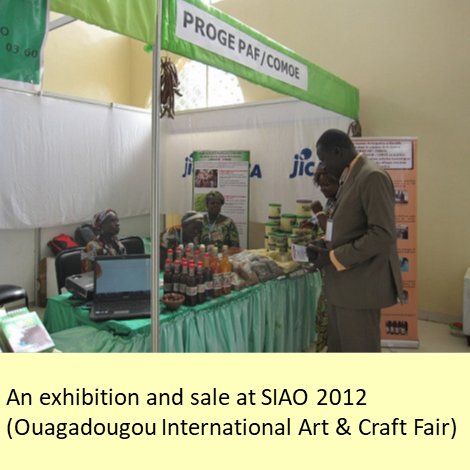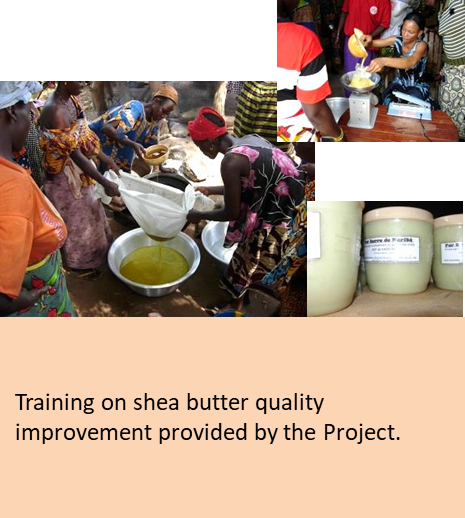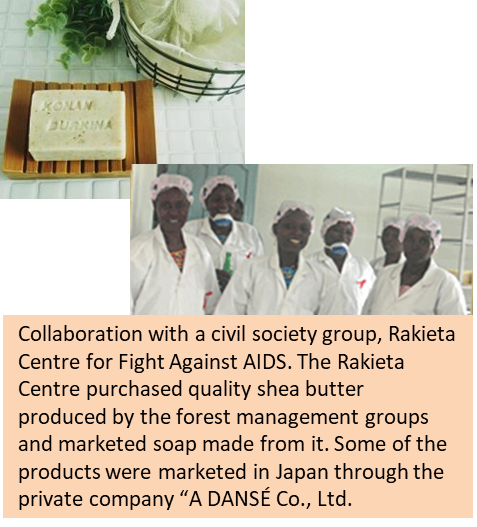#Non-Timber Forest Product (NTFPs) #Win-Win Partnership
Project Summary
New Win-Win Partnership for Community Forest Management Groups, Private Companies, Civil Societies, and Government
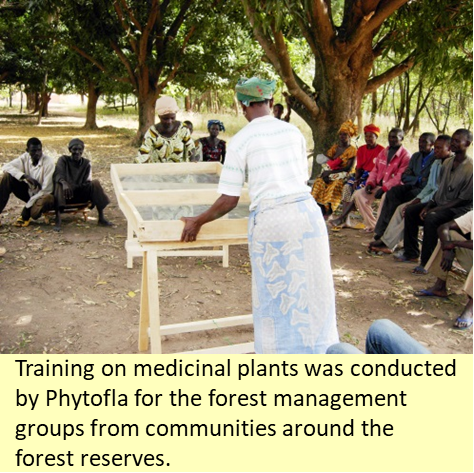 Source: A DANSÉ Co.,Ltd.
|
The project “Participatory and Sustainable Forest Management in the Province of Comoe” was implemented from July 2007 to December 2012 by the Government of Burkina Faso with technical assistance from Japan International Cooperation Agency (JICA). In this project, new forest management mechanism was proposed and promoted by increasing devolution of forest management and growing non-timber forest products in a manner that promoted socio-environmental responsibility. A noteworthy fact was that local companies and forest management groups from the community in the project area established a relationship that enhanced sustainable forest management and generation of non-timber forest product business.
Project Details
1. We can achieve sustainable forest management by working together with various actors: Government Agencies, Forest Management Community Groups, Private Companies and Civil Societies
To stop deforestation and strengthen resilience against climate change at the grassroots level, it is important to ensure the sustainability of forest conservation activities by local farmers. The Forest Reserves in the Province of Comoe suffered from serious fires, illegal hunting, illegal farming and excessive fuel wood logging, Additionally, it was a challenge to find out how the local population can conserve their environment and generate financial resources to support forest conservation activities together with the government.
In the Project, a private company and civil society played an important role to achieve the objective of establishing sustainable forest management.
The Project collaborated with Phytofla, a local pharmacy based in Banfora, to conduct a technical training on medicinal plants for the forest management groups from communities around the forest reserves. Phytofla bought the primary processed medicinal plants harvested in and around the forest reserves in line with the Project’s forest management plan. In the training, the forest management groups learned the way to harvest the medicinal plants without exhausting the natural resources, and also acquired the skills to dry and stock them properly. The forest management groups sold the materials to Phytofla and reserved sales proceeds for forest management activities, such as controlling and fighting forest fire which was the most problematic issue in the region causing land and forest degradation. Phytofla was able to procure the local medicinal plants more steadily and this contributed to regional economic development.
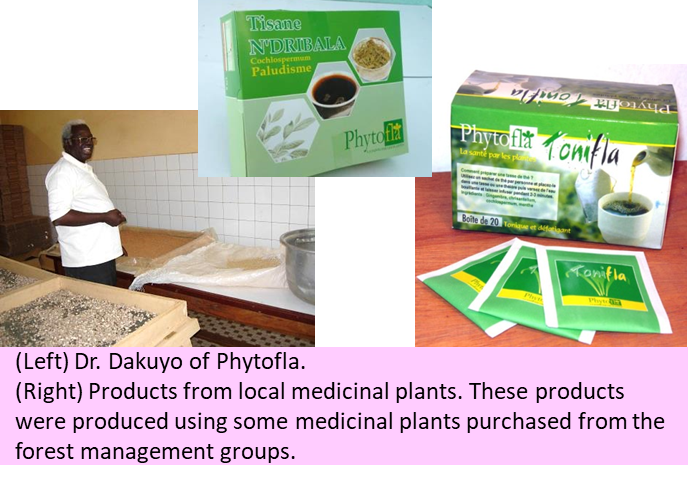
Source: JICA Project Expert
Rakieta Centre for fight against AIDS (Centre RAKIETA de Lutte Contre le SIDA) tied up with the forest management groups’ women members who participated in the training on quality shea butter production organised by the Project. The Centre manufactured soap using shea butter produced by these women. Its products were exported through the private company “A DANSÉ” and marketed in Japan. This mechanism proved that forest management groups could gain stable revenue from forest products,making people realised that sustainable forest management isviable.
- Source: JICA Project Expert
- Source: JICA Project Expert
As a result of these trial production and marketing, 11 million FCFA (equivalent to 18 thousand USD at the current rate) of sales were generated by the groups, most of which remained active even after the Project.
Total Sales recorded during the project
| Products | Number of Participating Forest Management Groups | Total Sales recorded 2009-2011 (FCFA) |
| Quality Shea butter | 21 | 6,406,775 |
| Medicinal plants | 11 | 4,565,525 |
Source: Rapport d’achèvement du projet, Projet de gestion participative et durable des forêts dans la province de la Comoé, JICA, 2013
2. Narrative Summary of the Project
Overall Goal : Participatory and sustainable forest management by local people had been continuously conducted in four project target Forest Reserves (Forêts Classées).
Project Purpose : Activities for forest management were commenced in four target Forest Reserves (Bounouna, Toumoussénni, Gouandougou and Kongoko) by local people through the Forest management Groups / Union of Forest Management Groups (GGF/ UGGF).
Output 1 : The national and local forest administrative agencies had enhanced capacity to support the local people in implementing participatory forest management.
Output 2 : The GGF/UGGFs had enhanced capacity in sustainable forest management in the target villages.
Output 3 : The living conditions of the local people were improved.
Output 4 : The Forest Management Plan (PAF) in the four Forest Reserves were formulated and put into practice.
Output 5 : The cooperative relationship between the national/local administrative agencies and forest administrative agencies was strengthened to implement sustainable forest management.
For more information, check the manuals/reports
The technical manuals created under the project are available from the links below. The approach may be applied to other countries especially in arid/semi-arid areas!

